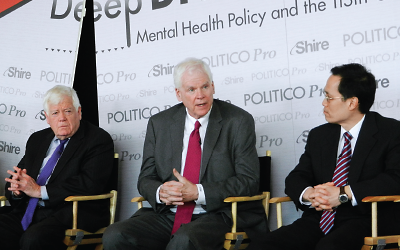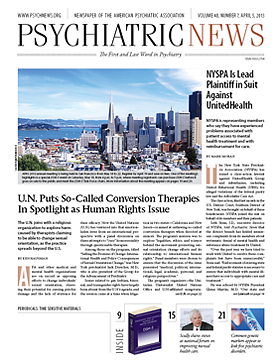The push to improve mental health policy in the United States is facing multiple obstacles on Capitol Hill, despite the recent clamor about the need for new mental health legislation in the wake of gun-law debates, members of a panel organized by Politico newspaper agreed in a public discussion March 5 in Washington, D.C.
The panel consisted of James H. Scully Jr., M.D., APA medical director and CEO; C. Edward Coffey, M.D., CEO of behavioral health services at Henry Ford Health System; Philip Wang, M.D., deputy director of the National Institute of Mental Health (NIMH); and two members of Congress, Rep. Jim McDermott (D-Wash.) and Rep. Phil Roe (R-Tenn.), who were practicing physicians before being elected. McDermott is Congress’s only psychiatrist.
Recent high-profile shooting incidents, particularly the Newtown school massacre, again brought mental health issues to the forefront of political debate, reigniting pushes for health care policies that foster increased access to care. When asked about the likelihood of any new mental health legislation being passed by Congress in 2013, McDermott, who is a member on the House Ways and Means Subcommittee on Health, said he was pessimistic.
Roe, chair of the House Education and Workforce Subcommittee on Health, Employment, Labor and Pensions, expressed his concern that linking mental health issues directly to gun violence, as some advocates and members of Congress are doing, can worsen the stigma attached to mental illness and leave people with untreated mental illness less likely to seek care.
“[Mentally ill patients] currently wait on average about two years after experiencing symptoms before they get treatment,” Wang pointed out. NIMH is exploring ways to decrease the time to get patients, especially those with early psychosis, into effective treatment.
Getting patients into treatment faster, however, requires a mental health care system that is far reaching and easily accessible. “The [care] delivery system is failing in this country,” said Coffey, who runs an integrated mental health program within Michigan’s Henry Ford Health System that he said has dramatically reduced the suicide rate in the past decade to near zero. “[The current system] is chaotic, it’s inefficient, it’s not integrated, it’s not as good as it could be,…and it costs more than it needs to,” he stressed. “We need a total redesign of the health care system.”
Access to quality mental health care continues to be hampered by inadequate funding. “We have been, socially, squeezing the money out of the system” since the 1970s, McDermott stated. Scully emphasized that “it’s time for a presidential commission” to solve the systematic and long-entrenched problems hampering the mental health care system.
Nearly five years after the mental health parity law was passed, the insurance industry is still dragging its feet implementing it, due largely to the government’s delay in passing relevant regulations to guide implementation of the law’s provisions, the panelists agreed.
When available, insurance coverage for mental health care is usually not on a par with that for other illness categories. “It pays so low that it costs you money to see a patient,” which is why many practitioners do not take insurance, Scully commented. Both Scully and Coffey agreed that it is long overdue for mental health care to be integrated back into the rest of medicine.
“We have the mental health care we are paying for,” Scully said. Without a substantial increase in funding, effective treatment and important knowledge about mental illness cannot get to Americans who need this care.
The Politico event was supported by funding from Shire Pharmaceuticals, the maker of several drugs to treat attention-deficit/hyperactivity disorder. ■

